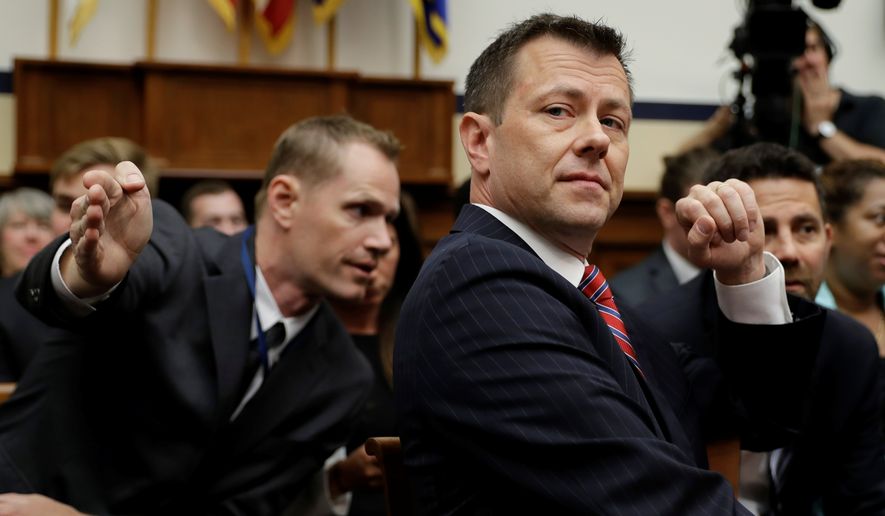ANALYSIS/OPINION:
Early 2017, the dawn of the Trump era in Washington, saw an intense rush of Russia news stories, fed by what conservatives call the “deep state” determined to brand the new president as an election colluder.
Looking back, those stories seem to have coincided with evidence unearthed by a House Republican task force.
North Carolina Rep. Mark Meadows on Monday released a text-message exchange between FBI agent Peter Strzok and his lover, FBI attorney Lisa Page. He said it showed a deliberate strategy in 2017 to leak anti-Trump stories. In his example, Mr. Meadows cited an April 11 Washington Post story that disclosed a secret wiretap on Trump campaign volunteer Carter Page.
Mr. Strzok headed the Trump-Russia probe at the time and would have known such highly classified details.
After The Post story appeared, Mr. Strzok told Ms. Page “well done” and said there would be more news stories about her “namesake.”
“For months, we’ve seen evidence suggesting FBI/DOJ leaked to the media for their own purposes,” Mr. Meadows said. “Today, we have a new text.”
A Justice Department inspector general report found that far too many FBI agents were talking with reporters.
“We identified numerous FBI employees, at all levels of the organization and with no official reason to be in contact with the media, who were nevertheless in frequent contact with reporters,” Inspector General Michael Horowitz said.
The Post story was one in a series that winter/ spring that seemed to come from Obama administration loyalists and alleged Trump-Russia election collusion — a charge that remains publicly unproven today.
“The sheer number of leaks of highly classified information in early 2017 was astounding,” said a Republican congressional staffer. “Every one of these leaks was spun by both the leakers and the media to falsely indicate collusion between the Trump team and the Russians. This was an information warfare operation launched by Trump’s political opponents at the top levels of the intelligence agencies and the Obama administration. We’ve never seen anything like it before.”
The list of leaked classified information:
• January 2017. CNN reports on the discredited Christopher Steele dossier being briefed to President-elect Trump at Trump Tower. Then-FBI director James B. Comey took Mr. Trump aside and told him about only one of many allegations — that he had engaged in sex with prostitutes in Moscow in 2013. The Republican majority of the House Permanent Select Committee on Intelligence said James Clapper, President Barack Obama’s top intelligence official, was privately talking to CNN at the time. He later went to work for CNN as an analyst.
• February 2017. The Post discloses that incoming National Security Adviser Michael Flynn conducted phone calls in December with Russian Ambassador Sergey Kislyak. They discussed economic sanctions, a topic Mr. Flynn at first denied. The story was based on leaked secret intercepts.
• February 2017. The New York Times reports that the intelligence community owns a large number of intercepts and phone records between the Trump campaign and Russian intelligence. Mr. Comey alerted Congress that the story was wrong, and repeated his denial in open testimony before the Senate Select Committee on Intelligence.
• March 2017: Mr. Comey goes before the House Intelligence Committee and announces that the entire Trump campaign is under investigation for possible Russian collusion.
• March 2017: Rep. Adam Schiff of California, the House intel committee’s top Democrat, reads the collusion charges from the Steele dossier at the same public hearing. The public later learned that the Hillary Clinton campaign and the Democratic Party funded Mr. Steele’s opposition research.
• March 2017. Evelyn Farkas, an Obama-era deputy assistant secretary of defense, says on MSNBC that she urged colleagues to collect intelligence on Trump collusion and protect it from the incoming administration.
• April 2017. Mr. Strzok and Ms. Page conspire to leak stories.
• April 2017. A Washington Post story discloses a wiretap on Carter Page, who had traveled to Moscow in July 2016 to deliver a public speech. The dossier said he met with two Kremlin figures. Mr. Page said he didn’t.
• April 2017. The Washington Post reports that Blackwater security firm founder Erik Prince met with a Russian Kremlin figure during the transition to set up a back channel with Moscow. Mr. Prince testified the meeting was impromptu in a bar at a hotel in the Seychelles and denied there was a back channel. Mr. Prince, a sometime adviser to the Trump campaign, has been interviewed by special counsel Robert Mueller.
In “Fear,” Bob Woodward’s book on the Trump White House, the author criticized Mr. Comey for deciding to brief the incoming president on a salacious piece gossip.
Mr. Comey, then-CIA director John O. Brennan and Mr. Clapper met Mr. Trump to explain the intelligence community’s assessment that Russia hacked Democratic Party computers, stole emails and released them through frontmen, such as the international hacker Guccifer 2.0 and the anti-secrecy website Wikileaks.
“I was surprised, not at the allegations, which might be true, but that the intelligence chiefs, particularly the FBI director, would present any of this to Trump,” Mr. Woodward said.
“And then, almost as an afterthought, Comey had introduced the dossier as if to say, by the way, here is this scurrilous, unverified, unsupported footnote with some of the ugliest allegations against you,” he added. “They wanted the formal assessment to be believed by the president-elect. Why pollute it with the dossier summary? They knew enough about Trump to know it would rile him up. It likely would have riled anyone up. Why would they accompany some of their most serious work with this unverified dossier?”
• Rowan Scarborough can be reached at rscarborough@washingtontimes.com.




Please read our comment policy before commenting.